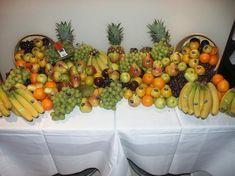
THIS WEEK saw the double celebration of the official launch of this year's Fairtrade Fortnight and the 10th anniversary of the Fairtrade mark.
The theme of this year's fortnight - A Taste for Life - aims to celebrate the quality of life Fairtrade provides for producers and the quality of their Fairtrade foods.
The celebrations began with a breakfast at London restaurant Mezzo. The event was hosted by Fairtrade Foundation patron, BBC newsreader George Alagiah and Hilary Benn, secretary of state for international development, delivered a speech outlining the importance of the growing Fairtrade offer.
Benn said that the message of Fairtrade is a simple one: to pay producers a fair price for the work they do. He said: "The Fairtrade offer is not about charity or sentiment. It is about producers getting a fair price for a fair day's work. It is the most practical effort in the short-term to help producers earn their way out of poverty. Fairtrade also allows consumers to do something personally."
More than 250 retail products carry the Fairtrade mark in the UK and exotic fruit lines are an important part of this growing area. Lines now include grapes, lemons, mangoes, plums and oranges.
Benn thanked the supermarkets and convenience stores for their efforts but stressed it really is only the beginning. "It is important we recognise the supermarkets and the growing number of convenience stores that promote and stock Fairtrade products. However, we hope they are going to continue to increase the offer available in stores," he said.
The Co-op, the first major store to take the ethically traded move seriously after consulting with shoppers in 1995, said that one in four of its bananas are fairly traded and that it expected annual sales of Fairtrade lines to reach £21 million as it continues to expand its ranges.
Harriet Lamb executive director of the Fairtrade Foundation praised the people behind Fairtrade and the consumers who recognise the value in its concept. "Fairtrade, backed by a vibrant social movement of people throughout the country, is now bedding into the mainstream, giving thousands of producers in developing countries the chance to build a better future and to compete in the all too cut-throat global markets," she said.
Lamb highlighted the phenomenal rise of the Fairtrade mark in the 10 years since its inception. She said: "By the end of 2003 shoppers were spending over £2m a week at the checkout on products with the Fairtrade mark. This compared to the £2.7m spent in the whole of 1994."
There may be some way to go before Fairtrade catches up with the organics market, but the principle remains the same: to pay a bit more for something morally worthwhile. Sales of Fairtrade bananas have shown a remarkable similarity to those of the organics sector, starting slowly, gathering speed and now heading straight up.
The UK public eats 333,000 Fairtrade bananas every day and Fairtrade now holds four per cent of the UK banana market. Sales of Fairtrade bananas have risen in the four years from 2000-2003 by 206 per cent.
Some 6,000 events are expected to take place around the UK during Fairtrade Fortnight. There will be widespread activity around supermarkets with supporters doing taste tests of Fairtrade foods.
Highlights of the events planned include a traditional boat bringing a cargo of Fairtrade bananas from the Windward Islands to Southampton for distribution to everyone in the city from the mayor to hospital patients.
Other institutions are also launching new buying policies to coincide with the launch of Fairtrade Fortnight. The Salvation Army is starting a switch to Fairtrade foods - a move to be rolled out in its 800 centres and supported by TV chef Brian Turner.
The UK is now the second largest market after Switzerland for Fairtrade. Sales are rocketing in the US and Europe's market grew 30 per cent last year to almost £400m.
Fairtrade patron Alagiah stressed the importance of recognising how far the Fairtrade organisation has come in the last 10 years, but that the goal was clear for the next 10. He said: "Stable regular incomes help producers beyond recognition but now we want to take the next step. We want to make the principles of Fairtrade the principles which all consumers share and want from their products."
EXOTIC EXPANSION
REDBRIDGE AFI's exotics manager Alan Crockford has witnessed the continued development of the exotics market and sees consumers’ willingness to try different products helping to develop the market further.
Crockford said: "The market is continuing to expand. New sources are constantly being developed to cover previous gaps in supply and this in turn has enabled customers to offer consumers year-round supply."
Proof of the success of exotics over the years is that many products have crossed over into the mainstream. "There are many products that over the years have become mainstream," he adds. "Products such as avocados, mangoes, mangetout, sugar snaps and baby corn are just a few examples. These are being given an increasing amount of space on retail shelves and are more prevalent in restaurants as demand and usage both increase."
With consumers now seeing some exotics as part of the mainstream offer. Crockford feels they are being more adventurous in their purchases and tastes. "Overseas travel has opened consumers eyes to a wide range of fruit and vegetables that they possibly did not know existed before," he said. "When they return home they want to try and experience this food again. The rising number of cookery programmes on television are also helping to show consumers how to prepare and cook some fruits and vegetables that they may have avoided or been unaware of in the past."



